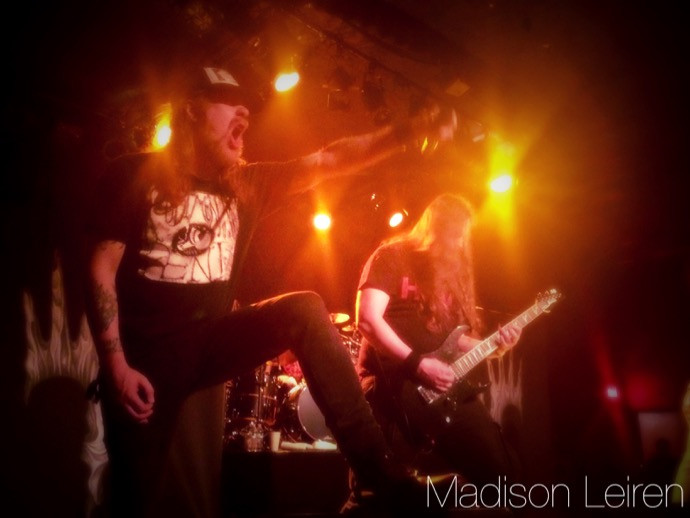
(BadWolf reviews the Seattle date of the Decibel Magazine 2015 Tour, accompanied by exclusive photos taken by Madison Leiren, except where noted.)
This is the third of four annual Decibel Magazine tours that I’ve reviewed for No Clean Singing (I missed the third installment, featuring Napalm Death headlining, due to Maryland Deathfest. I’m not sorry). At this point in time, the mechanics of the tour itself — the way it interacts with coverage in the magazine, the way that the lineup is formed over time, and the way it is presented artistically — are becoming apparent to me.
Rather than simply assess the show I saw itself, it’s important to discuss these deeper factors, because Decibel Magazine wields a lot of market power in the United States, and the US remains the biggest music market in the world even though metal remains relatively unpopular here. In that respect, however, the tour is operating in an easy middle ground between what I would call respect for profits and respect for the metal zeitgeist. They do that by locking in headliners that already have clout and draw, but aren’t going to pursue metal as a full-time activity, and slotting openers who intend to make a career out of music. At least that’s how it’s worked for the past two years.
It seems as though 2014 was a prototype and 2015 was the first successful rollout of a set Decibel Tour formula. The recipe is as follows:
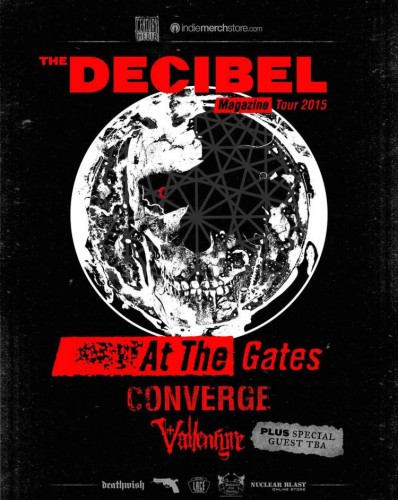
Headliner: classic DM band with at least one classic album who have headlined a date at a recent Maryland Deathfest, as well as released a successful album in the past year, one which has made Decibel’s top album of the year list. Last year? Carcass. This year? At The Gates.
Second to last: successful hard-touring band with a dependable legion of fans, guaranteed to put on a high-energy stage show. Last year? The Black Dahlia Murder. This year? Converge.
Third to last: critical darling band in search of a wider audience, one that Decibel Magazine has put a lot of page space into supporting. The Decibel Tour amounts, to an extent, to a debutante ball for this group. Last year? Gorguts. This year? Pallbearer.
Non-local opener: Pit-friendly band with connections to the metal underground, one early in their career and sporting a charismatic frontman. Last year? Noisem. This year? Vallenfyre.
Local openers to taste.
(Side note: This doesn’t leave too many options for the tour’s headlining slot next year if it’s to follow the recipe. Autopsy and Amorphis are options, but neither really has the draw of an At The Gates. Bloodbath and Sodom are also tempting options, but again: is the audience there? Napalm Death could happen, but they’ve done it before. Honestly, the best bet is probably Neurosis, but I doubt that band will ever do a huge tour again. Next year promises to be very interesting on this front.)
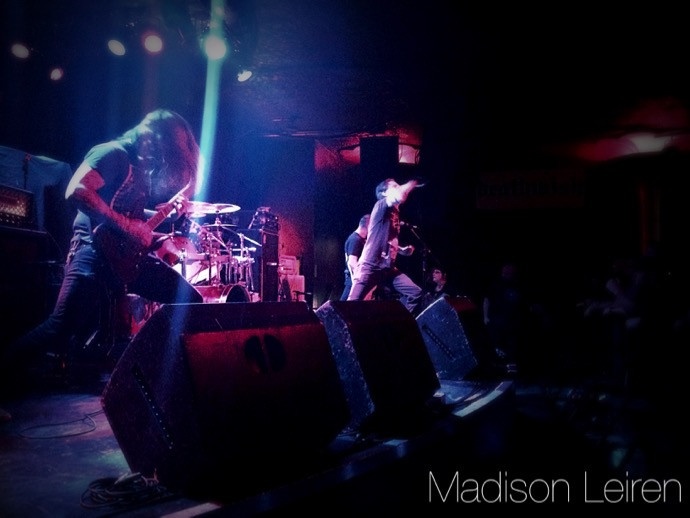
And the taste of Seattle was also the toast of Seattle, at least at this moment in time. Local openers Theories, road veterans for years, weren’t just opening the Decibel Magazine Tour at Showbox Market on March 31st, they were also celebrating the long-awaited release of their debut album, Regression, which is still being received with a mix of positive-to-glowing reviews. Still, despite being hometown heroes, the crowd for Theories was a bit sparse, though that’s probably more to do with their 7:30 time slot and the fact that Showbox Market is the largest stage I’ve ever seen them play. As a result, I’m not sure if their set was a victory lap or a warm-up.
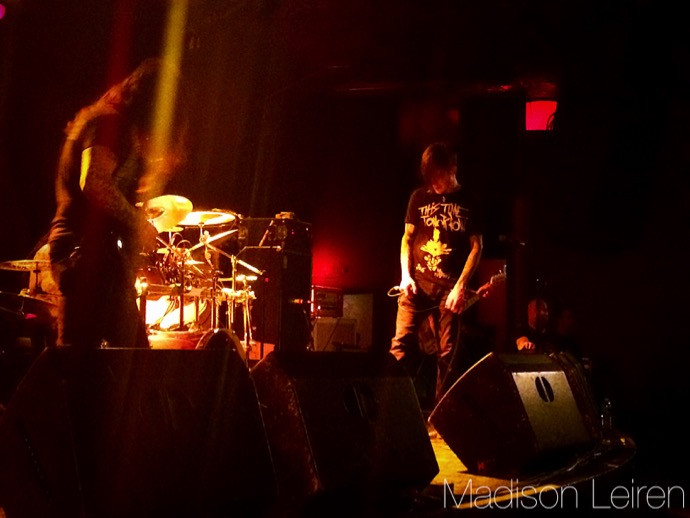
Their take on death grind is more well-suited to enclosed spaces anyway, but the abridged set time treated them nicely. The group got on stage, blitzkrieged through most of Regression (how the fuck did nobody get their mosh on during “Shame”!? Shame on you, Seattle!), and left me, at least, wanting more. Their set came across as more of a trial-run for their upcoming tour with Black Breath and Goatwhore than a triumphant celebration of their record, but that’s fine. Theories are a road band. The sweet spot on their bat is small, dark venues where they can get six inches away from your face, not on a stage, behind a barricade, under a mirror ball.
The local opener slots on Decibel Tours serve either to pay homage to longstanding vets who never get out enough (Cretin) or to jump start the careers of up-and-comers (Royal Thunder, who were signed to Relapse shortly after their opening set on the very first Decibel Tour). Theories are neither veterans, nor are they newbies, even if it was their first album release show.
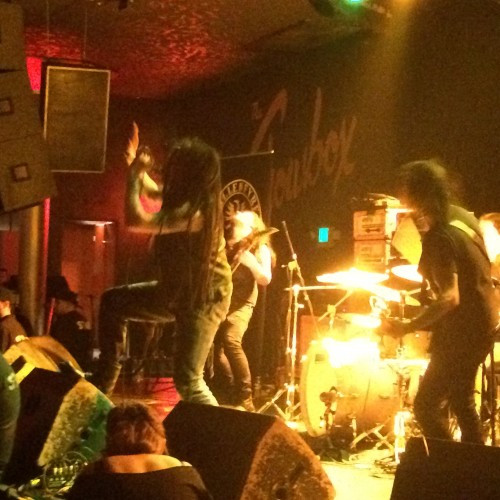
Vallenfyre photos by Islander
In due fairness to the remainder of the bands, however, it wasn’t until Vallenfyre began setting up that I realized they were the band I was most excited to see. Madness, right? After all, Pallbearer is one of the most critically-acclaimed bands of any genre right now, Converge are always spectacular and wrote some of my no-bullshit favorite records, and I was going to top them all off with At The Gates, a band whose shadow looms large over extreme metal twenty years after their first breakup, playing new songs. With all of the remaining courses of this metallic feast waiting in the wings, why was I hyped for, essentially, the tossed salad?
Some of it is that Vallenfyre is the brainchild of Greg Mackintosh, founding guitarist of British goth metal royalty (and beloved band of mine) Paradise Lost. Except while that band has become all about bringing The Sisters of Mercy’s sexy arena-rock depression into the 21st century, Vallenfyre is a death-doom and/or crust punk (depending on the song) project with Adrian Erlandsson, the drummer from At The Gates, and Scoot, the bassist from UK crust royalty Doom. Oh, also, “Bereft,” the lead single off their sophomore LP, 2014’s Splinters, is no-shit one of the best songs he’s ever written. And he wrote all of Draconian Times.
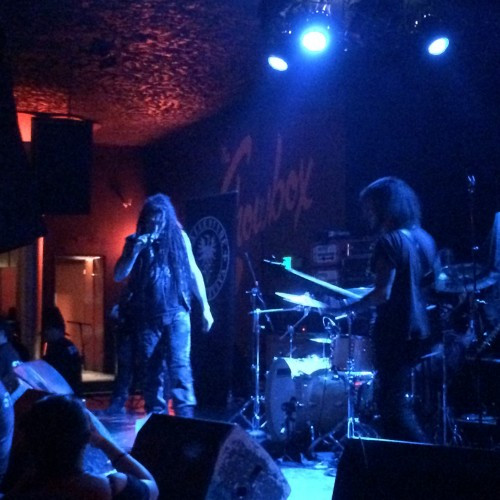
All of this I remembered as Vallenfyre took the stage, and my blood adrenaline level climbed. “Please be good. Please be good,” I kept praying to Dio or whatever dead metal singer stood in for the Demiurge at that instant. Vallenfyre kicked off into straight D-beats and grinding Kurt Ballou-inspired distortion. Even without Erlandsson on drums or Scoot on bass (neither could play for the set) the sound was tight and furious. “Fuck yes! It’s good! It’s really good!” The half hour set looked like it would cause no consternation, as the band wisely stuck to the faster, crust-inspired numbers in their repertoire.
Best, somehow, was Mackintosh, whose charisma seemed wasted on the crowd. His growl was pitch-perfect live, as was his dry British piss-taking wit. With his black dreadlocks flailing in widening circles like a cat-o-nine-tails, he kept leaping from monitor to floor to monitor. Most of the way through the set, I thought to myself, “This is what Randy Blythe was like after Sacrament came out,” and then “God, just play ‘Bereft’ and then drop the mic and you’ll win the Decibel Tour.” Mackintosh has been making metal since the year I was born, and he was acting like a man my age or younger, with all the exuberance of a real hardcore frontman. Until he wasn’t.
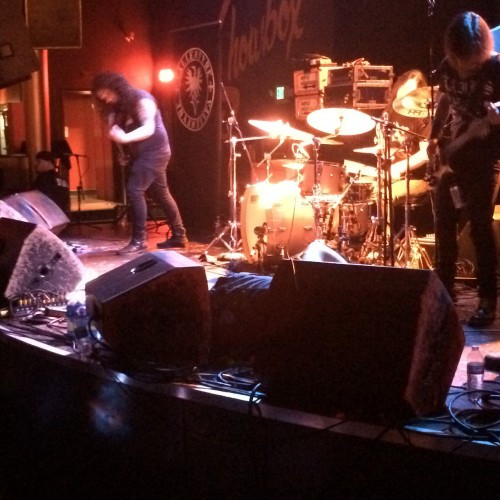
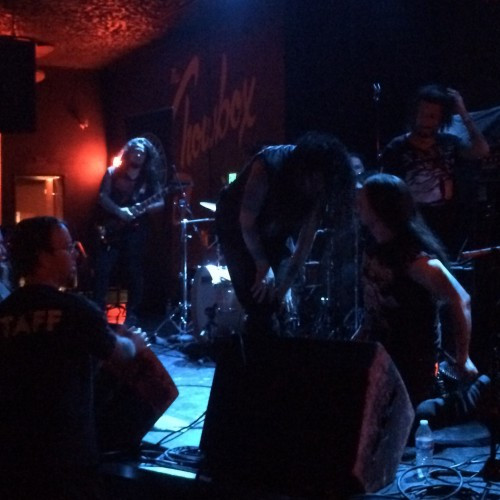
Mackintosh fumbled a leap from one of the monitors and landed on his side. The singing stopped, the music shortly thereafter, when it became apparent that something was wrong. His bandmates assisted him offstage and announced the set would not continue. Mackintosh sustained knee ligament injuries that kept Vallenfyre from playing the next two dates.
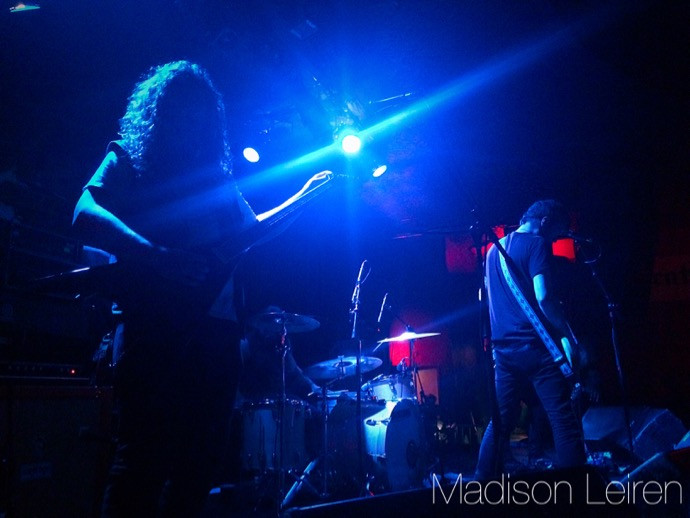 Then came Pallbearer, to wash the taste of disappointment from the mouths of much of the audience. But not me. As much as the Southern doom quartet has been able to enrapture metalheads since their 2012 debut, Sorrow and Extinction, I just don’t like it. In a feature on Crypt Sermon at Invisible Oranges, commentators laid into me for suggesting that Pallbearer are maybe not so good for the metal scene, purveyors of sound and style over songwriting substance (in fairness they also hated me for suggesting the same for YOB, even though over and over again I insist that I quite like YOB).Perhaps it’s that I don’t “get” what they’re going for, and with that in mind, I keep exposing myself to Pallbearer live.
Then came Pallbearer, to wash the taste of disappointment from the mouths of much of the audience. But not me. As much as the Southern doom quartet has been able to enrapture metalheads since their 2012 debut, Sorrow and Extinction, I just don’t like it. In a feature on Crypt Sermon at Invisible Oranges, commentators laid into me for suggesting that Pallbearer are maybe not so good for the metal scene, purveyors of sound and style over songwriting substance (in fairness they also hated me for suggesting the same for YOB, even though over and over again I insist that I quite like YOB).Perhaps it’s that I don’t “get” what they’re going for, and with that in mind, I keep exposing myself to Pallbearer live.
After this, my third Pallbearer set, I’m convinced that I do get it. I know what Pallbearer are going for. I just don’t like it. Their beautiful, elegiac take on doom seems too light to me, too devoid of substance and emotional heft, and too long in the tooth. Doom can be beautiful, but not at the expense of an actual sense of doom (the irony, that this is the exact argument people level at Deafheaven, whom I like, is not lost on me, but fuck it, I call ’em like I see ’em).
I’ll give them this, though: they’re good live. They managed to keep my attention for their entire set, and through the Showbox’s speakers, I really got a sense of the nuance in their compositions that was lost at previous shows. Still, by the end, all I could think was “just give me Converge.”
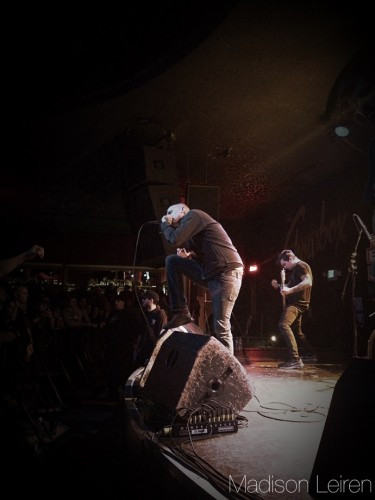
As it happens, Converge put on not only one of the finest sets of theirs I’ve ever seen (I’ve seen many), but the best of the evening bar none. The Boston Metallic Hardcore quartet are no fools. Realizing that they were about to play between a current critical darling and a legendary death metal group back from the dead, they packed their set with a mix of their most aggressive songs, as well as several deep cuts. After opening with “Eagles Become Vultures,” the group stuck to a few songs that utilized vocalist Jacob Bannon’s nasally clean vocals, such as “Aimless Arrow.” In the past, Bannon’s vocals have been the group’s sole sticking point, as years of touring have obviously left their mark on his insides. However, on this tour the band played behind a barricade, so Bannon had no easy way to stick his mic into the crowd and allow the band’s loyal fanbase to screech his lyrics—a common feint he employs. The barricade wound up not stopping him, though, and Bannon proved himself every bit the charismatic showman he’s always been. Converge was on point until they played the fan-favorite and seldom-played anthem “You Fail Me.” At that point, the band was catching fire, and the crowd was in constant motion. Converge almost never play the title tracks off their older albums, which tend to be longer and more melodic than their pit-friendly affairs.
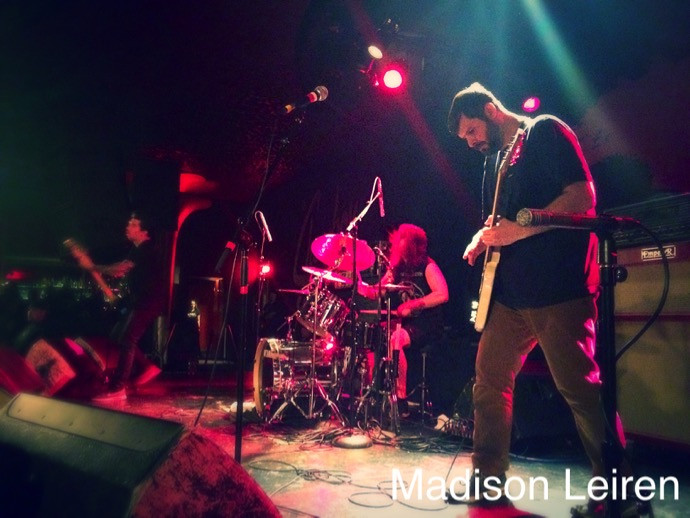
At the risk of sounding unprofessional, Converge is a band that saves lives, in the sense that the group’s message has always been a pretty convincing sell for the virtues of self-empowerment, whether they’re being political or lovesick (their only two modes, really). In that sense, the band is basically Hatebreed for people with liberal arts degrees, and they carry all the baggage that comes with that mantle. Yes, it’s sort-of douchey, but at least it’s music about being a better douche than you were yesterday, and I count myself among the people who’ve been led to being a better scumbag by Converge. It’s that phenomenon, their ability to resonate with upset young people, that fuels the band’s ferocious fanbase, and it’s those fans who make their shows such fun to watch. This is all a long-winded way of saying there are at least a hundred people at every Converge show who will see them come hell or high water, hoping that they’ll play a deep cut but never being upset that they don’t. So when Converge do play “You Fail Me”, things get exciting, and quickly.
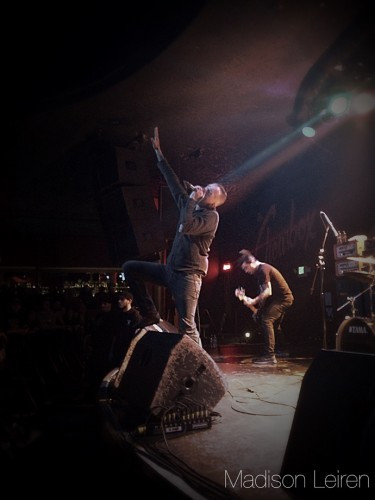
The pit got the better of me about two-thirds into their set, but I observed the final act, enraptured with a few friends on a balcony. “Two songs left”, Bannon announced, and the group launched into “Concubine,” the first song off their classic Jane Doe — the song they normally end their shows with, unless they play it at the very beginning. Which led me to wonder, “what the fuck are they going to play after “Concubine”? A few strained guitar chords, tolling like bells, announced the answer — one so obvious I should have seen it coming, were it not for the fact that I assumed I would never hear it live, because they never play it.
“Holy shit. Are they playing ‘Jane Doe’?”
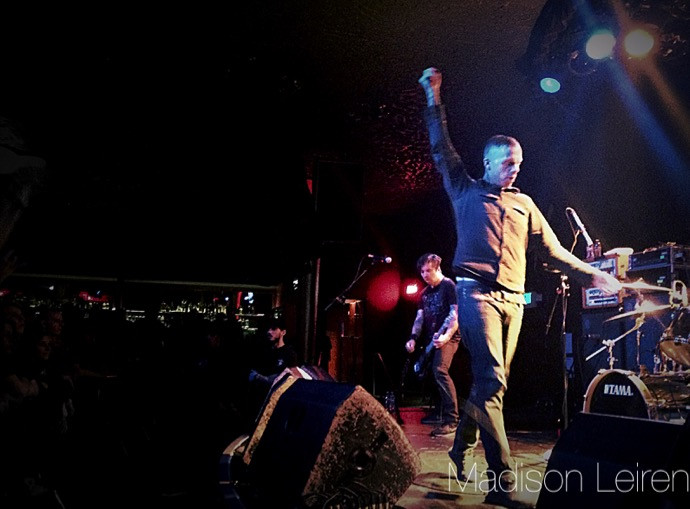
Yes, BadWolf. Yes they were. For the uninitiated, it’s a nearly ten-minute composition that shows off all aspects of the band’s music, from their melodic hardcore backbone to progressive and even gothic rock passages. In that live performance I saw aspects of the song, with its symphponic aspirations and progressive tempo-shifting song structure, that I hadn’t noticed before. Obviously, Bannon couldn’t replicate his multi-tracked “boys choir” for the choral chant of “I wanted out,” but every time he sang it seemed to grow in intensity. The Song culminated in a thunderous drum cascade by Ben Koller.
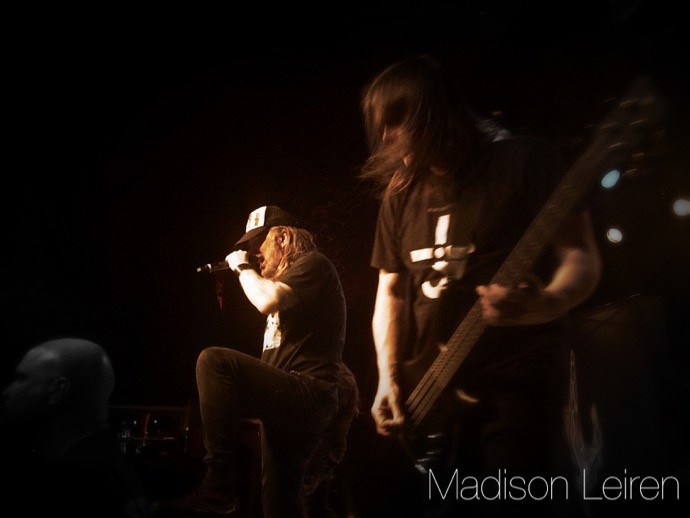
Given that, forgive me if I found At The Gates a bit wanting. It’s not that they weren’t spectacular. Every member of the legendary band has kept busy in other projects since the band’s initial breakup, but they made their very best material together and they’re aware of it.
How could they not be? The metal press/blogroll/illuminati have been championing their one-time swansong, Slaughter of the Soul, nonstop since it’s release. That the band broke up right after dropping that genre-defining bombshell only increased its fame. Literally, people praised it like manna from heaven while damning the subgenres it spawned (melodic death metal, metalcore) in the same sentence. To illustrate this further, directly before At The Gates took the stage, NCS co-founder Alexis turned to me and said, “Tell me they play stuff from Slaughter of the Soul. Please.”
“Girl,” I said, “They practically play the whole thing.” True to form, moments later the band took the stage, and after playing the first segment of their comeback album, At War With Reality, they launched into “Slaughter of the Soul.” Title track, second track, played second. Almost too on point.
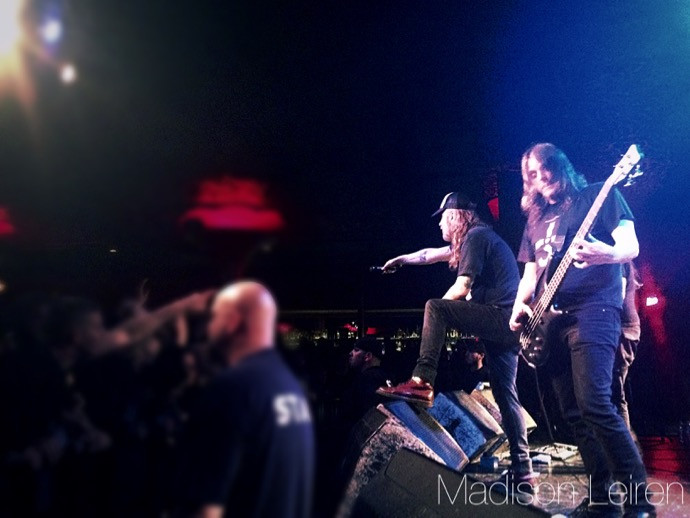
That’s the greatest strength and greatest weakness of At the Gates live. It’s all straight shots down the middle. This band perfected the death metal fastball and that’s all they do, with surgical precision. The set, all hour and a half of it, consisted of nearly all of their latest two albums, with a few sprinkles of older material floating around like chum in the water for people who lie and insist their older material is superior, which of course it is not. These are the same people who in some alternate universe where John Lennon is alive and doing a tour with Paul McCartney would get on Twitter and spew, “I guess seeing Sgt. Pepper live is alright, but really I want ‘I Wanna Hold Your Hand.’”
You can say that status trumps songwriting for a band like Mayhem, where every album is different and has arguable strengths and weaknesses, but with a band like At the Gates there is no question. Like with the theory of evolution, sometimes there is, in fact, a correct opinion.
Which I guess is why I flipped for the band at last year’s Maryland Deathfest. Sure, a new album had been announced, but it was as yet unwritten. For all I knew I would never get the chance to see them again, so I made the most of it. In that elated first-time state of mind, all straight pitches is better than curveballs because with curveballs comes the risk of taking the listener out of the moment. There were no surprises, and my opinion was over and over affirmed: This is as good as mainstream death metal gets. But at MDF there was a sense of danger still, a sense that anything could happen at any moment.
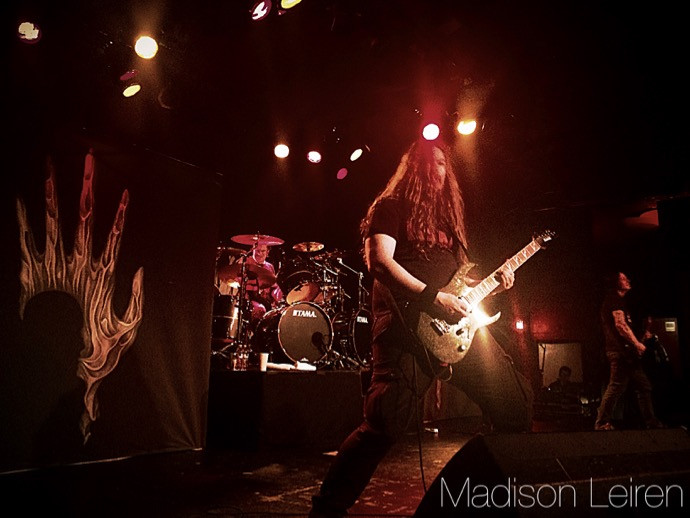
A small part of me believed that they might play until the cops shut the power off, that they might play deep enough into their repertoire to hit their cover of Slayer’s “Captor of Sin.” There was that kid-on-Christmas sensation that the next gift At the Gates unwrapped for me might hold more wonder than the last, because even though Christmas comes every year each individual Christmas happens once, so you need to make them count, but when you’re on tour the show happens every night until it’s over.
It was hard to find Christmas at the Decibel Magazine tour, where set times were clearly posted, and the band’s setlist was available easily online. I knew before it happened that right before playing “Kingdom Gone” Tompa would say to the audience, “We don’t like old school death metal,” followed by a dramatic pause, and then, “We LOVE old school death metal.”
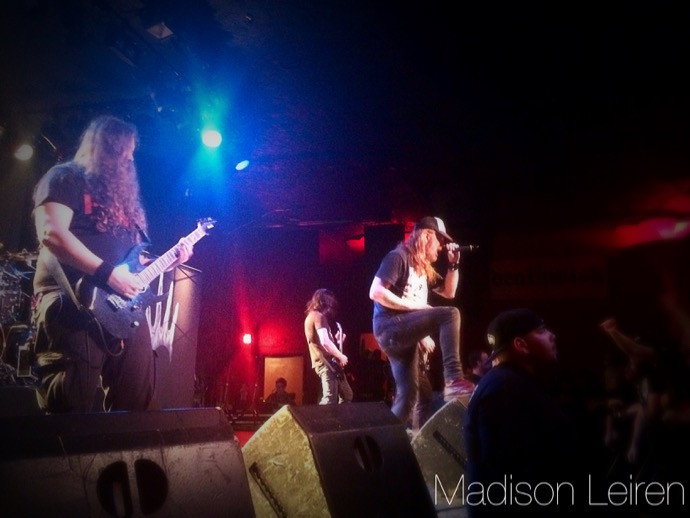
I believe him. But so does Converge. And Converge won the tour package for me, because deep cuts are where you find Christmas. Whoever headlines the next Decibel Magazine tour will have to love old school death metal as well, even if they don’t play it — it’s a prerequisite to the job. But whoever plays right before them will be able to do anything, which is in its own way more exciting.

Good review. I caught the San Francisco show of this tour (with Cormorant in place of Theories). For me, Vallenfyre were the definite winners of the night. Converge played a great set, too, but for some reason they’ve never really clicked with me.
“Girl,” I said, “They practically play the whole thing.”
Did you click your fingers sassily at the same time?
this sounds so awesome 🙂
Good write up, I particularly like your take on the Decibel Tour formula. You’re right about future big name DM acts, it’s going to be a stretch if they maintain this direction (Autopsy touring North America for 2 months? doubtful…). It will be interesting to see which direction they head towards in upcoming years.